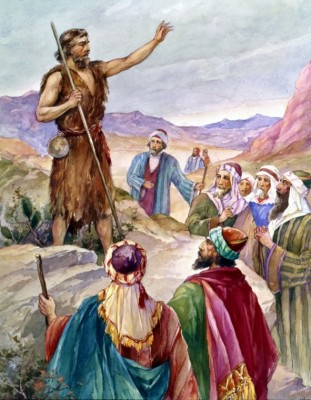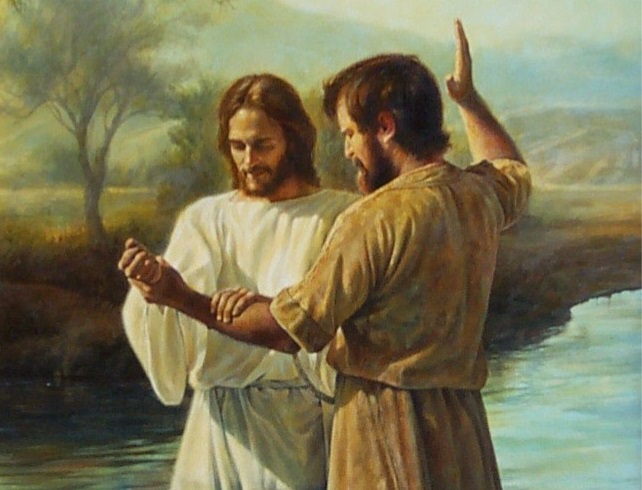For the herald’s voice is crying / in the desert far and near,
calling all to true repentance / since the kingdom now is here.
—Johann Olearius, “Comfort, Comfort Ye My People” (1671)
Alone of all the prophets, John hailed the Lamb who takes away the sin of the world.
—The Church of England, Common Worship (2008)
The Voice
He came out of the wilderness. His hair was long and caught up in seven braids. He wore camel’s hair clothes, rough and not so fashionable. He tied it together with a leather belt. Locust was his superfood and he preferred wild honey to Stevia. His name was John.
He cried with a loud voice. Anywhere he could. From a bluff. From big rocks. From a rise along the riverbank. Wherever there was a makeshift camp, a passing caravan, a crowd gathering at a waterhole … suddenly he would appear, and he would lift up his voice and cry:
“Repent! For the kingdom of God is at hand.”
Kingdom of God? The people knew those words. Daniel the prophet had spoken of a kingdom the God of heaven would set up in the latter days (Dan. 2:44). Kingdom of God. Kingdom of heaven. The kingdom of the coming Messiah.
The Messiah. Could the Messiah be John himself? Was he the promised King? Or was he perhaps some other figure out of a distant prophecy? Elijah was supposed to come as the Messiah’s herald (Mal. 4:5). And, if anyone could pull off the look and feel of Elijah, it was John.
Then again, Moses had spoken of a great Prophet, the greatest Prophet, who would speak all of God’s words, do great signs and wonders, and know God face to face (Deut. 18:15-19 and 34:10). Maybe this man was He.
Whoever he was, his message bit the soul with great force. He called the religious leaders “a generation of vipers” — “the seed of the Serpent.” He called all of God’s people to turn from their sins, not in word only, but most especially in deed. “Bring forth fruits appropriate for repentance,” he demanded. And he did something else. He summoned men and women alike to baptism, a cleansing rite that the prophets had associated with Messiah.
More and more people flocked to the wilderness to hear this man preach and — before long — he established himself on Jordan’s banks where Israel’s religious leaders could easily find him. It was only a matter of time before they showed up. Church police. He was an outside voice in religious matters and a potential rival to their authority. They came to examine his credentials, to see what he would have to say for himself.
“Who are you?” they demanded. “The Messiah?” Not that they would have believed him if he had said yes. “Or are you Elijah?”
“Nope,” he answered to all three.
“Who are you, then? We need to give an answer to those who sent us.”
And John said: “I am the voice of one crying in the wilderness, ‘Make straight the way of the LORD,’ as the prophet Isaiah said.”
“Then why are you baptizing if you’re not the Messiah or Elijah?”
Keep in mind … baptism was an Old Covenant concept and ordinance (Heb. 9:10; Num. 19). That’s why the theological experts didn’t ask, “What are you doing?” but rather, “Why are you doing it?” The baptisms they knew mostly pertained to certain Jewish sects in the area. But they knew there was another baptism, one that was both Messianic as well as eschatological (Isa. 52:12; Ezek. 36:25). But who was John that he should offer it?
“I indeed baptize you with water unto repentance,” John said, “but He who comes after me is mightier than I whose sandals I am not worthy to bear. He will baptize you with the Holy Spirit . . . and with fire.”
John’s Baptism
We’ve all heard it in Handel’s Messiah:
The voice of him that crieth in the wilderness, Prepare ye the way of the Lord, make straight in the desert a highway for our God.
Ev’ry valley shall be exalted, and ev’ry mountain and hill made low; the crooked straight and the rough places plain.
And the glory of the Lord shall be revealed, and all flesh shall see it together: for the mouth of the Lord hath spoken it.
The words come from Isaiah 40:1-5. The voice is that of John the Baptist. God was about to manifest His glory before all flesh, and He chose this particular man to serve as His voice.
John was the son of a priest and a Nazarite from birth, a birth that had been foretold in the Temple (Luke 1:5-22). He came “in the spirit and power of Elijah” to prepare Israel for the Messiah’s coming (Luke 1:17). His message was one of glory and judgment. The kingdom of heaven, the redemptive rule of God through His Messiah, was about to explode into history with news of the King. John’s message regarding the new King posed a challenge to all men, beginning with Israel: Will you submit, obey and be faithful or will you be a rebel?
 John hit a nerve. Submission requires repentance. Men must acknowledge their transgressions of God’s law and turn away from them. The King required action, visible fruit. Mere “bloodline” descent from Abraham meant nothing: “God is able of these stones to raise up children to Abraham,” John said. He pictured the King, the Messiah, standing at the threshing floor that was Israel with a winnowing fan already in His hand. This Messiah would separate the chaff from the wheat: He would gather the wheat into His barn and burn up the chaff with unquenchable fire. The Judge was knocking at the door. Israel … each Israelite … must make a choice. The consequences would be eternal.
John hit a nerve. Submission requires repentance. Men must acknowledge their transgressions of God’s law and turn away from them. The King required action, visible fruit. Mere “bloodline” descent from Abraham meant nothing: “God is able of these stones to raise up children to Abraham,” John said. He pictured the King, the Messiah, standing at the threshing floor that was Israel with a winnowing fan already in His hand. This Messiah would separate the chaff from the wheat: He would gather the wheat into His barn and burn up the chaff with unquenchable fire. The Judge was knocking at the door. Israel … each Israelite … must make a choice. The consequences would be eternal.
Those who professed repentance, John marked with baptism. Baptism pointed to cleansing, to new birth and resurrection (Ps. 51:7; Ezek. 36:26-27; Titus 3:6). It was a sign and seal of the work of God’s Holy Spirit. The Messiah was coming to baptize Israel with God’s Spirit or with the fires of God’s wrath. There could be no neutral ground. Those who would repent and receive their King would have the gift of the Holy Spirit (Acts 2:38). Those who rejected repentance, who continued in their self-righteousness, would face temporal and eternal wrath. (The destruction of Jerusalem, with all its horrors, was little more than 40 years away.)
Behold, The Lamb Of God!
John’s first work was to call Israel to epistemological self-awareness. Each Israelite needed to know his own sin. And each needed to repent. John’s second work was to introduce the Messiah Himself. And so one day, John saw his cousin Jesus coming to Jordan for baptism. John knew Him for who He was, and he tried to put Him off, “hey wait a minute … I need to be baptized by You, and are You coming to me?”
But Jesus insisted. For though He had no sins, He needed to be identified with His people, and He needed to be set apart to His priesthood by one already a priest (Matt. 21:23-27). And so John baptized Jesus in the Jordan. As Jesus came up from the river, the heavens opened, the Spirit of God, dove-like, descended upon Him, and the Father in heaven said, “This is my beloved Son, in whom I am well pleased” (Matt. 3:16-17). And so, baptized and anointed, Jesus of Nazareth, the Son of God, became the Christ, the Anointed One, the Prophet, King, and Priest of divine redemption.
It was about this same time that John pointed to Jesus and called out, “Behold the Lamb of God, who takes away the sins of the world!” And here is the last puzzle piece. How can a sovereign and holy God forgive sinners? Good works have no merit. Repentance has no merit. Man has broken God’s law, and God is rightly offended. His wrath is just and inevitable. Unless …
“The Lamb of God.” A sacrifice. A substitute. One whose life is of infinite value. One who in His own body and soul bears the wrath of God against sin in the place of His people. To repent, then, means to embrace the Lamb, to trust His shed blood, to find in Him new life and the power for obedience. Entry into God’s kingdom lies through the blood of the Lamb.
A Dying Voice
John died a martyr’s death for condemning King Herod’s marital sins (Matt. 14:3-12). Jesus said he was the greatest of the Old Testament saints, the greatest of the prophets. But John got to see Jesus, his Messiah. He had the amazing privilege and responsibility of introducing Him to Israel. And yet, Jesus said, “the least in the kingdom of heaven is greater than he” (Matt. 11:11). John still operated in the shadows of the Old Covenant. He didn’t live to see the cross or the empty tomb. He didn’t live to Pentecost. The blessings of New Covenant life far surpass even the glories of John’s ministry … because the King has come. The kingdom of heaven, then and now, is a reality.


Add Comment